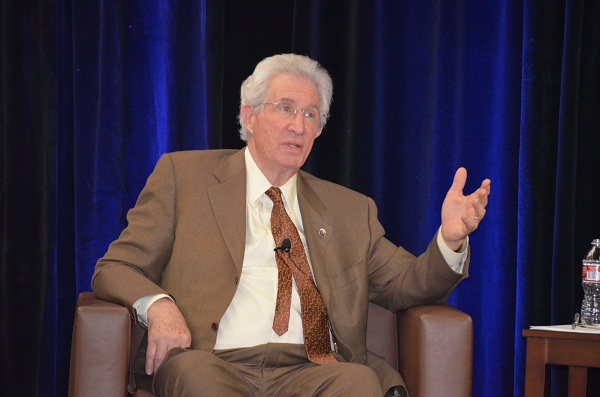 |
|
Richard Solomon, president of the United States Institute of Peace, is a witness to the signing of the Shanghai Communique four decades ago.[WANG JUN/CHINA DAILY] |
The China-US relationship has come a long way in the past 40 years after US President Richard Nixon's initial visit to China in Feb 1972.
The visit "seized the moment, seized the hour, transformed history," said Kal Raustiala, director of Burkle Center, to open a conference titled Nixon in China: A Legacy Revisited that was held on the UCLA campus on Feb 23.
The conference, conducted to take a closer look at the trip and how it transformed history, was organized by the UCLA Burkle Center of International Relations, the UCLA Center for Chinese Studies and the UCLA Confucius Institute, with the participation of USC's US-China Institute.
China Consul General in Los Angeles Qiu Shaofang said the China-US relationship has become the most important international relationship. The two countries have the shared responsibility and high expectations from the international community.
China and the US combine for one third of the global economy, one fourth of the corporate world and one fifth of global trade, Qiu said.
Qiu related Nixon's China trip to the recent top news on China-US relationship - Chinese Vice President Xi Jinping's visit to the US between Feb 13-17. "Xi paid a very successful visit to the US last week," Qiu said, revealing that during the trip, Xi's business delegation signed 149 agreements with the total value close to $40 billion.
"How many trade agreements had been signed with Nixon in his trip to China?" asked Clayton Dube, executive director of the USC US-China Institute. The answer is zero. "The days were different," Dube said, reflecting the ever closer economic relations between the two countries. Assignment: China–The Week that Changed the World, a documentary of Nixon's historic trip made by USC's US-China Institute, talks to mostly media people who covered Nixon's trip to reflect the changes.
Nearly 100 US correspondents landed in China to begin their unforgettable and adventurous journey.
Back in 1972, China was still in the "cultural revolution" (1966-76). For the United States, China was the second concern; Soviet Union and to maintain its power balance was the primary concern, said Julia Strauss, visiting researcher at UCLA Asia Institute.
During the visit, President Nixon met with Premier Zhou Enlai and Chinese officials nine times. The presidential party visited areas of Beijing, Hangzhou and Shanghai, touring many cultural, industrial and agricultural sites, shows the documentary.
The president also watched a ping pong game at the Capital Gymnasium, and a ballet, The Red Detachment of Women at the Great Hall of the People in Beijing.
Standing on the Great Wall, Nixon said, "thousands of miles over the mountains and valleys of this country built over 2,000 years ago ... This is a great wall built by great people ... It's a symbol of what China in the past had been, and what in the future China could become."
He said, "my hope is in the future as a result of a beginning that we have made in this journey, many, many Americans, especially the younger Americans who love travel so much would have the opportunity to come here as I have come here today."
"There are walls erected. There are physical walls like this, while there are other walls, ideology, philosophy would not divide people in the world ... Finally, we came a long way," Nixon said.
As a milestone in China-US relations, on Feb 28, 1972, in Shanghai, a joint communiqué was issued between the People's Republic of China and the United States.
The "Shanghai Communiqué" outlined the "social, political and ideological differences between the two countries. It also stated the shared principles of non-aggression, non-interference, equality and peaceful coexistence."
Forty years later, the Soviet Union disappeared and the Cold War finished. Yunxiang Yan, professor of anthropology and director of the Center for Chinese Studies at UCLA, said consumerism replaced communism to become the driving force of the world.
Richard Solomon, president of the United States Institute of Peace, concluded by saying g the current China-US relationship is "strategically ambiguous" in his keynote speech. The two countries have different interests in international affairs like the Taiwan issue. However, they have shared concerns, such as creating jobs.
Solomon said whether China and US could manage their important, complicated relationship well into the 21st century will result either in "mutual benefit or great loss."
To work together with mutual respect is our only way forward, said Qiu Shaofang.
Assignment: China – The Week that Changed the World is available to view at:
http://china.usc.edu/ShowArticle.aspx?articleID=2672


 Relief reaches isolated village
Relief reaches isolated village
 Rainfall poses new threats to quake-hit region
Rainfall poses new threats to quake-hit region
 Funerals begin for Boston bombing victims
Funerals begin for Boston bombing victims
 Quake takeaway from China's Air Force
Quake takeaway from China's Air Force
 Obama celebrates young inventors at science fair
Obama celebrates young inventors at science fair
 Earth Day marked around the world
Earth Day marked around the world
 Volunteer team helping students find sense of normalcy
Volunteer team helping students find sense of normalcy
 Ethnic groups quick to join rescue efforts
Ethnic groups quick to join rescue efforts













